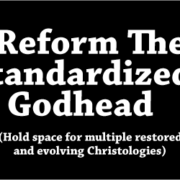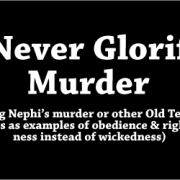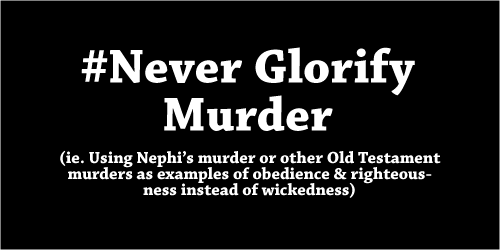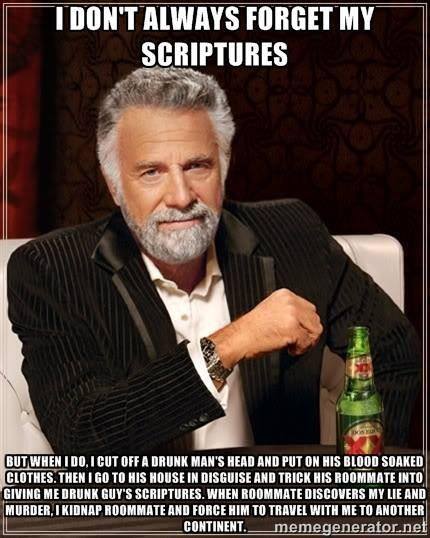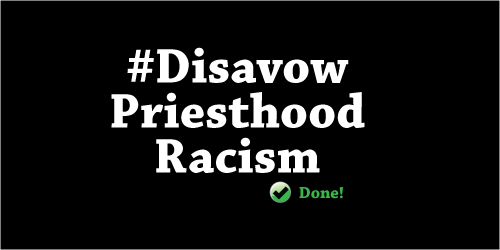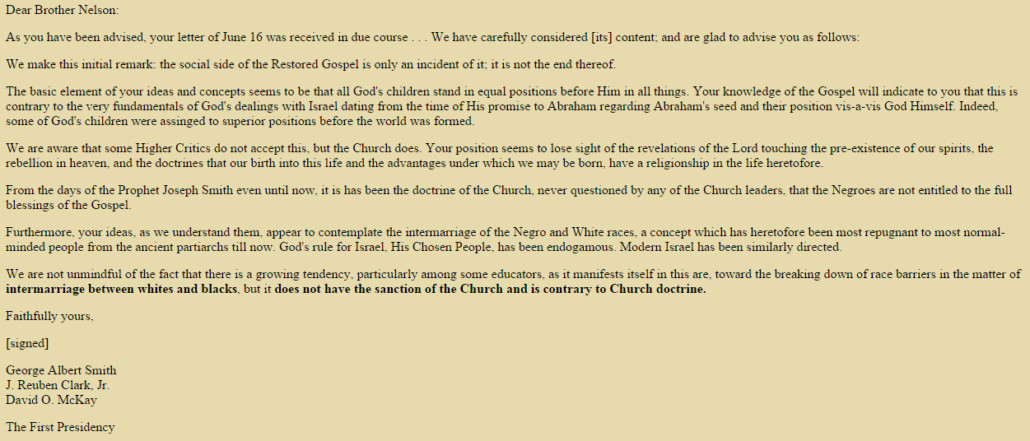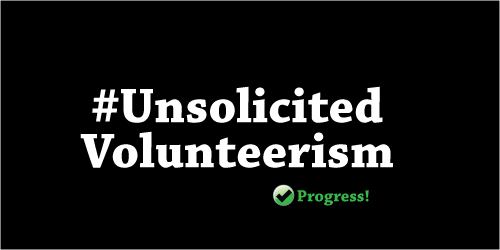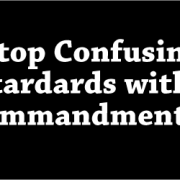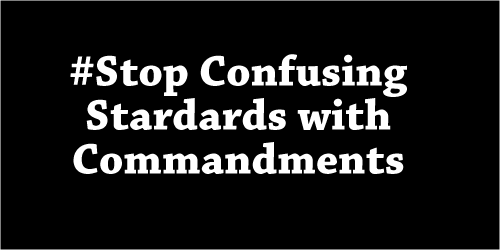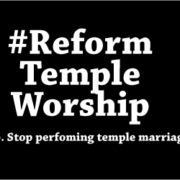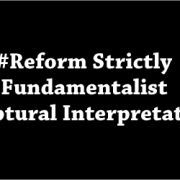Reform Overly Rigid View of the Nature of the Godhead
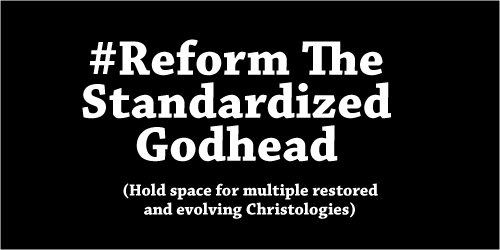
The Church needs to UNDO the Nicene Creed, instead of creating their own version of it as they somewhat have. Allowing space for MULTIPLE working orthodox Christologies, which help us LEAD greater Christianity into more knowledge instead of simply alienating ourselves from them.
Joseph Smith restored at least TWO seemingly distinct Christologies, just as the early pre-Nicene Church had. The first of these was at least on the surface similar to the standard Nicene view, where the Father was “a personage of Spirit,” and the Son “a personage of Tabernacle.” (See Lectures on Faith) Christ being “both the Father & the Son” (Ether 3/Mosiah 15). Even Joseph Smith’s early 1832 & 1835 accounts of the first vision aligned with this view, mentioning only ONE divine being.
Later in Joseph’s life, he restored an expanded, more complex view of the Godhead similar to many of the pre-Nicene sects of Christianity. This included expanding his account of the First Vision to include the more complete two divine beings. As well as the ideas on the progression of Gods. This mirrored the expanded social-trinity Christologies held by many first and second century Christian Jews & Egyptians mystery schools which taught various views of God, just as valid as the views which won out in the Nicene Creed.
WE SHOULD HAVE FAITH THAT THIS WAS BY DESIGN! Joseph’s job as a restorer was not necessarily to completely solve these early Church disagreements and paradoxes, but to restore them and let the church body relook at them as God continually reveals himself. But instead of holding space for these multiple views, the church has more or less created its own Nicene Creed, or idol, defining a particular orthodox (and often inconsistent) view. WE NEED TO REFORM THIS, and lead the way in helping greater Christianity relook at the many ways the prophets, scriptures and early church fathers saw the Godhead. And take care not to turn our conception of god into a rigidly carved idol.
.
[TLDR SUMMARY: THE ORIGINAL GOVERNMENT OF GOD WAS SIMPLE. A KING’S COURT (PHAROAH’S COURT). FATHER-SONs-SERVANTs. Each of these echelons had multiple ‘modes’ of communication. Divine Presence, divine Word, the divine Name, the divine Angel, the divine Mantle, the divine Face/Arm/Hand/etc and finally the divine Spirit (or communal/astral projection). Its that simple. All are ONE COURT. Each act in the name of the KING YHWH. With the mixing of Egyptian (modalism-ish) & Babylonian/Greek (trinitarian-ish) cultures these concepts became convoluted. And occasionally used wrong. Especially in how Spirit & Word or other ‘modes of communication’ are mixed up or convoluted with the BEINGS who send them. Specifically SPIRT or HOLY GHOST being convoluted with Father, Son or Servants. ‘Modes‘ are not beings or persons or personages, but are sometimes convoluted as so (Especially divine Spirit). More importantly, Because the titles are tied to glories or levels of the divine court. (father-son-servants or celestial-terrestrial-telestial). Then if you try and tie father or son or spirit to a personage you will confuse the terms after they ascend or condescend. (such as Christ being father AND son). The terms are fluid, and must be interpreted as changing fluid titles. This is why the Theosis or ascension/condescension of god (the gods) was only taught in the inner court, because the uninitiated would confuse the terms when they didn’t understand their fluid nature.]
Godhead Reform
In the following book/article, I’d like to make the argument that the LDS church should follow the example of Joseph Smith and our scriptural canon, to keep our TWO separate Christologies separate. One public. One secret. Chruch theology & temple theology. (which is how the Jews and Egyptian systems did things). Teach publically the traditional godhead (or reformed trinity) taught in our scripture, the lectures on faith and Joseph’s early teachings on god. But keep it separate from our Temple Theology or temple Christology or teachings on god Theosis and the mysteries of God. In the following article, I will lay out the scriptural basis for those TWO Christologies or Godheads, and then use an abundance of apocryphal texts to make a case for their separation.
Traditional Godhead of LDS Canon
The Book of Mormon and Joseph Smith’s canonized Lectures on Faith contain Christologies which uniquely challenge Nicene Christians, while at the same time being quite similar in a way that seems to meet traditional Trinitarians where they are. Joseph Smith explicitly taught that the Father is defined as “a personage of Spirit” and Christ is presented as BOTH the Father AND the Son.
In Lectures on Faith, originally part of the Doctrine & Covenants we read,
“There are two personages who constitute the great, matchless, governing and supreme power over all things… They are the Father and the Son: The Father being a personage of spirit, glory and power… The Son, who was in the bosom of the Father, a personage of tabernacle, made or fashioned like unto man, being in the form and likeness of man… He is called the Son because of the flesh… He, being the Only Begotten of the Father, full of grace and truth, and having overcome, received a fulness of the glory of the Father, possessing the same mind with the Father, which mind is the Holy Spirit that bears record of the Father and the Son. These three are one.. (Lectures On Faith 5:2)
Similarly, the Book of Mormon lays out a Godhead or Christology more compatible (or palatable) to standard Trinitarian view with many verses about Christ being BOTH the Father and the Son. A concept often befuddled by D&C 130:22 and traditional/cultural LDS views of God established later by Brigham Young.
14 Behold, I am he who was prepared from the foundation of the world to redeem my people. Behold, I am Jesus Christ. I am the Father and the Son… 16 Behold, this body, which ye now behold, is the body of my spirit; and man have I created after the body of my spirit; and even as I appear unto thee to be in the spirit will I appear unto my people in the flesh. (Ether 3:14–16)
1 And now Abinadi said unto them: I would that ye should understand that God himself shall come down among the children of men, and shall redeem his people. 2 And because he dwelleth in flesh he shall be called the Son of God, and having subjected the flesh to the will of the Father, being the Father AND THE Son— 3 The Father, because he was conceived by the power of God; and the Son, because of the flesh; thus becoming the Father and Son— 4 And they are one God, yea, the very Eternal Father of heaven and of earth. (Mosiah 15:1–5)
27 …verily I say unto you, that the Father, and the Son, and the Holy Ghost are one; and I am in the Father, and the Father in me, and the Father and I are one. (3 Nephi 11:27)
And the angel said unto me, behold the Lamb of God, yea, even the Eternal Father! (1 Nephi 11:21, 1830 edition)
And I looked and beheld the Lamb of God, that he was taken by the people; yea, the Everlasting God, was judged of the world… (1 Nephi 11:32, 1830 edition. See also 1 Nephi 11:18, 11:40, Mormon 7:7)
These are VERY IMPORTANT distinctions. As the words of Joseph Smith in the Lectures on Faith and Book of Mormon also agree much more closely with what the revelation of the LORD’s Jewish prophet Jachanan Ben Kathryn says concerning how the gentiles have corrupted the true understanding of the Godhead, presumably through their creeds and platonic thinking.
4 Ye shall correct the Gentiles in their ways, for, lo, they have corrupted themselves; in things old and new they have corrupted themselves, in that they say I am not one. Lo, I Am One, saith the LORD. JHWH is my name. I have none other. My Spirit is holy and my tabernacle is Saviour. I am Saviour, and beside me there is no god. There is no other path but mine. I split not asunder. Thou shalt not be instructed of the churches, but thou shalt instruct them, for indeed have they corrupted themselves before me; and my spirit shall come upon you to teach the nations. (Book of Ben Kathryn 46:14)
Theosis & The Progression of Gods (LDS Temple Teachings of the Godhead)
The last two years of Joseph Smith’s life, and then under the leadership of Brigham Young, the Church changed the view of the Godhead taught in the Book of Mormon and in Joseph’s Lectures on Faith to restore/introduce the progressive theosis concepts taught in Joseph’s King Follet Discourse & Sermon in the Grove and the Temple. It was during this time that Brigham introduced the now denounced Adam-God Theory and to began to push out the more traditional view of God held as the base theology earlier in Church history. I believe this ‘standardization’ of the more speculative aspects of the nature of God was not unlike the early church’s mistake in codifying the trinity at the Nicene Creed. (only in reverse)
In fact, just as the Nicene creed corrupted Christianity by expelling Nestorians, Monophysites or others who did not align with the rigid Trinitarian dogma, Brigham codified our current view of the ‘Godhead Doctrine’ into the third question of our Temple Recommend questions.
But I believe we need to recognize that this speculative Christology is just that, and just as Brigham’s Adam-God theory went TOO far into speculation, so also D&C 130:22’s statement that “the Father has a body of flesh and bones as tangible as any mans… [and] the Holy Ghost… is a personage of Spirit” was NOT a revelation, was written ONLY according to William Clayton’s memory of what he THOUGHT Joseph said in conversation with a small group at Ramus Illinois on April 2, 1843. (JS Papers rendition) That Willard Richards ‘Journal’ account comes only from William Clayton’s account (JS Papers rendition). And that it DIRECTLY CONTRADICTS what Joseph Smith carefully laid out in his canonized Lectures of Faith, speaking of the Godhead.
The idea of whether God the Father has a corporeal body is a contentious one. And regardless of whether its true we should note that Joseph seemed to be careful NOT to say that God the Father has a body of flesh & bone in either the King Follet Discourse or the Sermon in the Grove. Much like the Lectures of Faith, he calls him only a ‘personage’. Using the same language as Hebrews 1:3 and the Nicene Creed. (hypostasis, translated as ‘being’, ‘substance’ or often ‘personage’).
I have always declared God to be a distinct personage, Jesus Christ a separate and distinct personage from God the Father, and that the Holy Ghost was a distinct personage and a Spirit: and these three constitute three distinct personages and three Gods. (JS. Sermon in the Grove, June 1844)
1 God… hath in these last days spoken unto us by his Son… Who being the brightness of [God’s] glory, and the express image of his person[age] (hypostasis), and upholding all things by the word of his power, when he had by himself purged our sins, sat down on the right hand of the Majesty on high [highest divinity]. (Hebrews 1:1–3)
[the people] pray unto [my person] because I am with them… And now Father, I pray unto thee for them…that I may be in them as thou, Father, art in me, that we may be one. (3 Nephi 19:22–23)
This language refutes the Nicene Creed’s, which condemns as heretics those who hold that Christ “is of another substance or essence” (hypostasis) than the Father; but still carefully stays within the language used by Hebrews chapter 1. We should be doing the same today as our base theology. Yet still holding space for all the views of the godhead without dogmatically condemning either classic Trinitarians or the more speculative aspects of our expanded Theosis & progression of Gods doctrines. We need to relook at D&C 130:22’s statement that “the Father has a body of flesh and bones as tangible as any mans… [and] the Holy Ghost… is a personage of Spirit“, realizing it WAS NOT A REVELATION. It may or may not be a true statement of Joseph Smith, but either way I do not believe it was ever meant to be canonized by Brigham and should remain in the realm of speculative Temple Theology and therefore the tradition of mysticism. NOT MAINSTREAM DOCTRINE.
Even Joseph Smith’s 1838 late account of the first vision is careful NOT to say the Father had a body, but again uses the careful terminology of the lectures on faith of “two personages” standing in vision before him (before he “came to himself sprawling on his back”). With the first quoting from Matt. 3:17, Matt. 17:5 & 3 Nephi 11:7. In fact, given the obvious allusions to Matt 17:5 it’s entirely possible that Joseph leaves out the detail that the first ‘personage’ might have been somewhat obscured in a cloud of the “light above the brightness of the sun” (JS-H 1:16–17) in the same manner of Matt 17:5’s language. This would better explain why in his earlier 1832-1835 accounts of the first vision, he mentions only one being.
5 While he yet spake, behold, a bright cloud overshadowed them: and behold a voice out of the cloud, which said, This is my beloved Son, in whom I am well pleased; hear ye him. (Matt 17:5)
We as an LDS people need to repent, and turn to Jewish peoples to help us understand the ancient concepts of goodhood progression and God’s ‘modes, ’emanations’ or ‘spirits’. We should explore the new “Jewish” ideals of godhood taught by authors like Blake Ostler (books/youtube), Dan McClellan (books/youtube), and Margaret Barker (books/youtube), but at the same time we should NOT get weighed down or attached to speculative dogma that puts narrow definitions on the nature of God which lead to division just as the Nicene Creed did!
What is well established in LDS & Biblical scripture is that GOD has a council, and that he has invited us into a unity with that council.

God as a Divine Council (Kings Court) of King/Sons/Servants
1 God (Elohim) has taken his place in the divine council; in the midst of the gods (elohim) he holds judgement. (Psalm 82:1) I AM the LORD thy God, which brought thee out of Egypt (Psalm 81:10 – YHWH thy Elohim)
19 Therefore hear the word of the LORD: I saw the LORD (YHWH) sitting on His throne, and all the host of heaven standing by Him on His right and on His left. (1 Kings 22:19)
6 For who in the skies above can compare with the Lord? Who is like the Lord among the heavenly beings? 7 In the council of the holy ones God is greatly feared he is more awesome than all who surround him. (Psalms 89:6–7)
The LORD said unto my Lord, Sit thou at my right hand, until I make thine enemies thy footstool. (Psalms 110:1, Matt 22:44, Acts 2:34)
21 And there came forth a spirit [to the divine council], and stood before the Lord, and said, I will persuade him. (1 Kings 22:21)
6 Now there was a day when the sons of God [bene elohim-of the council] came to present themselves before the LORD (YHWH), and Satan came also among them. (Job 1:6)
4 Where were you when I laid the foundations of the earth?… when the morning stars (kowkbe) sang together and all the sons of God (bene elohim) shouted for joy? (Job 38:4–7)7 And the Lord God (YHWH of the Elohim) formed man (ā-ḏām) of the dust of the ground, and breathed into his nostrils the breath of life (Spirit); and man [the Son of God, Luke 3:38] became a living soul… 22 And the Lord God said, Behold, the man is become as one of us [an Elohim]… 2 That the sons of God saw the daughters of men that they were fair; (Gen 2:7, 3:22 & Gen 6:2)
Remember the days of old…When the Most High [El Elyon] apportioned the nations.. and fixed the boundaries of the peoples according to the number of the gods. (Duet 32:7-8) [70 nations/stars or sons of God. as per Dead Sea Scrolls]
32 According to that which was ordained in the midst of the Council of the Eternal God of all other gods before this world was, that should be reserved unto the finishing and the end thereof, when every man shall enter into his eternal presence and into his immortal rest. (D&C 121:32)
The LORD said unto my Lord, Sit thou at my right hand, until I make thine enemies thy footstool. (Psalms 110:1, Matt 22:44, Acts 2:34)
Sing praises to God, sing praises! Sing praises to our King, sing praises! For God is the King of all the earth (Psalms 47:6–7)
…he who is the blessed and only Sovereign, the King of kings and Lord of lords” (1 Tim 6:16, Rev 17:14)
“Rosh—the head, Sheit—grammatical termination… “The head one of the Gods brought forth the [council of] Gods.” That is the true meaning of the words. Baurau signifies to bring forth. If you do not believe it, you do not believe the learned man of God. Learned men can teach you no more than what I have told you. Thus the head God brought forth the Gods in the grand council… The head God called together the Gods and sat in grand council to bring forth the world.” (Joseph Smith, King Follet Sermon).
4/7.11. And God shall have a Council and throne… 04/7.12. And God shall rule on his throne, for it is his; and his Council shall rule with him; in My name [YHWH] they shall have dominion over angels [terrestrial glory] and mortals [telestial glory] belonging to the earth. 04/7.13. And God shall appoint Chiefs under him who shall go down and dwell on the earth with mortals; and the labor of these Chiefs shall be with mortals [in telestial glory] for their resurrection. And these Chiefs shall be called Lords [Adonai, not YHWH], for they are Gods of land, which is the lowest rank of My commissioned Gods. (see Oahspe, Book of Jehovah, ch.7)
MAN:33:14 Later, Osireh went up into the Sacred High Place [of heaven] and there learned the ordinances for the wellbeing of man. He was given the rules for safeguarding the Sacred Mysteries, and he was also shown the workings of the Great Law. When he came down he chose the best of those about him and appointed the Council of Light, which numbered twenty-four… MAN:33:25 Such was Pharaoh, a god below gods, a man above men… the narrow channel between God and man, one whose task was to reveal God to men. The family of Pharaoh was, in the first place, chosen by the Council of Light. (Kolbrin, Book of Manuscripts)
See also excerpts on The Zoroastrian Book of Creation. (Domenico Thrope Translation, Oxford Press. Found in my article ‘The Cosmology or Times and Seasons (& Biblical ‘Weeks’ Prophetic Calendar)‘
“That they all may be one; as thou, Father, art in me, and I in thee, that they also may be one in us” (John 17:21)
.
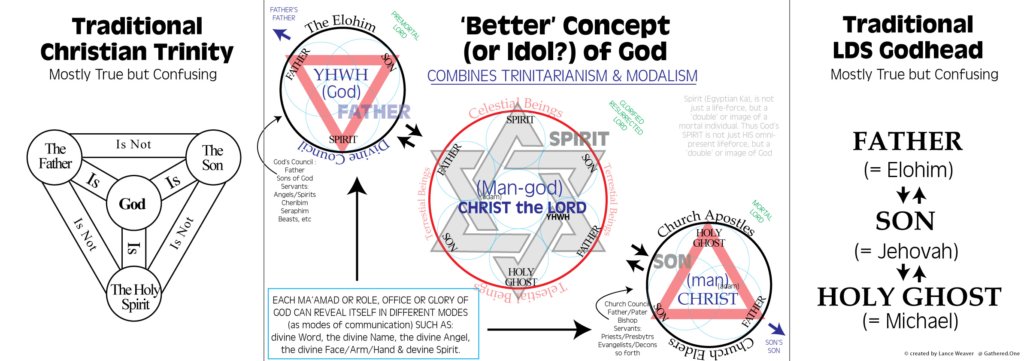
My Theory
Now with the basics of my reform ideas out of the way, I’d like to spend the rest of this Book/Article, explaining my Theology or Christology of the Godhead.
As you’ll see I have my own revisionist explanation of how Joseph Smith saw the Godhead, and how the different levels of the heavenly court are organized and how Jesus literally became Father, Son & Holy Spirit (condescending and re-ascending). But again to be clear, I think we should move away from imposing rigid views on this topic. Whether they be mine, Brigham Young’s or anyone else’s. We should be free to speculate and steer clear of creating our own ‘Nicene Creed’ type definitions which define orthodoxy on this difficult to understand topic. We need to enlarge the Christian tent to include all ‘good’ versions of ‘ism’.
But to summarize my view, the Godhead is set up much like a typical KINGS COURT. With ‘roles‘ of king (FATHER), his sons (SON) and Servants. These three levels of the court use many different ‘modes‘ of communication with their subjects. These modes of communiqué include the divine Presence, divine Word, the divine Name, the divine Angel, the divine Face/Arm/Hand and finally the divine Spirit (or communal projection). I believe New Testament writers were influenced by Neoplatonistic thought to make the Spirit or Holy Ghost a third (lesser) member of the Godhead in a way that’s only half true and very confusing. Spirit or Holy Ghost is better described as God’s foremost mode of communiqué. An Egyptian concept (ka) of a thought-form that shared the mind of an individual (see Kolbrin quotes below). It was also a dualistic reference to the invisible Highest God behind the King. And because of this dualism was easily confused.
I believe we should follow Joseph’s definition of ‘The One True God’ distinguished in D&C 76’s Three Glories of God. There, he defines the unity and separation of God in the same way that he defines the ‘One True Church’. (see my article here). An assembly or collective of completely unified but separate individuals spanning different glories or hierarchies. Father, Son & Servants.
So in general terms, instead of ever talking in terms of persons or personages or essence we should divide God only into three levels of GLORY of equal beings according to the Celestial, Terrestrial & Telestial glories which D&C 76 suggests the Godhead oversees (and condescends into). Thus Father, Christ & Servants are not individual personalities, to be worshipped through a personality cult. But titles of Glories full of EQUAL beings whom we worship in obedience and emulation. In terms of divine progression however, they are personalities AND glories that we can trace out and follow with one progressing into the other.
92 And thus we saw the glory of the celestial, which excels in all things—where God, even the Father, reigns upon his throne forever and ever; 94 They who dwell in his presence are the church of the Firstborn; and they see as they are seen, and know as they are known, having received of his fulness and of his grace; 95 And he makes them equal in power, and in might, and in dominion. 96 And the glory of the celestial is one [wherein dwells the fullness of the Father v.92], even as the glory of the sun is one. 97 And the glory of the terrestrial is one [wherein receive of the presence of the Son, but not of the fulness of the Father. v.77], even as the glory of the moon is one. 98 And the glory of the telestial is one [wherein is the Holy Spirit but not the presence of the Son v.86], even as the glory of the stars is one; (D&C 76:77–98)
Compare this with the glory and oneness of God taught in the bible.
“…and we beheld his glory, the glory as of the only begotten of the Father” (John 1:14)
“And now, O Father, glorify thou me with thine own self with the glory which I had with thee before the world was.” (John 17:5)
“That they all may be one; as thou, Father, art in me, and I in thee, that they also may be one in us” (John 17:21)“Hear, O Israel: The Lord our God, the Lord (YHWH) is one.” (Duet 6:4/Mark 12:29)
“For there is one God, and there is one mediator between God and men, the man Christ Jesus” (1 Tim 2:5, 1 Cor 8:6)
And now, behold, this is the doctrine of Christ, and the only and true doctrine of the Father, and of the Son, and of the Holy Ghost, which is one God, without end. Amen. (3 Nephi 11:27)
In other words, The Father, Son & Holy Ghost are archetypes or symbols of ONE God who manifests across different ‘glories’ or levels of eternal beings. Completely unified in heart, mind and spirit, but separate in glory, function and only sometimes individuality. The term LORD God (YHWH Elohim, and sometimes Spirit) would be synonymous to the Egyptian terms (quoted in the Kolbrin below) ‘Head God’, or ‘God of the Gods’, or ‘Father of the Gods’ or “the Council of the Eternal God of all other gods” of D&C 121:32. It is NOT a term referring only to Jesus, but can apply to BOTH the Father AND/OR the Son, AND/OR even the Spirit — as the Son & Spirit are both modes of communication of the Father. (As in a king giving his title or name & even a piece of his consciousness to a son or servant which allows that being to speak in His Name).
Thus Jehovah or YHWH is not the name of the Father or Son, but is a title of BOTH the Father and the Son (Mosiah 15:1–5, Ether 4:7), and even sometimes also the Spirit or Angel of the LORD or any one of many emanations/titles given in scripture. YHWH is the title given to ALL echelons or ‘glories’ of the ONE God. Which is why the ancients combined the title with the plural word for god (Elohim), to stress the composite nature of the unified deity. This becomes more clear from scriptures like those below where YHWY is applied to nearly all aspects of God, as well as from the many Egyptian texts seen later in this article from the Kolbrin.
YHWH/JEHOVAH AS FATHER
8 “But now, O Jehovah (YHWH), thou art our father; we are the clay, and thou our potter; and we all are the work of thy hand.” (Isaiah 64:8)
6 “Do ye thus requite Jehovah (YHWH), O foolish people and unwise? is not he thy father that hath bought thee?” (Deuteronomy 32:6)
22 And I saw no temple therein: for the Lord (YHWH) God Almighty and the Lamb (Christ) are the temple of it. (Rev 21:22)
11 “I (Jehovah/YHWH) am a father to Israel, and Ephraim is my firstborn.” (Jeremiah 31:9)
“I thank thee, O Father, Lord (YHWH?) of heaven and earth…” (Matt 11:25, see also John 10:30, 17:11-23, D&C 20:28; 121:28)
YHWH/JEHOVAH AS SON
“Very truly I tell you,” Jesus answered, “before Abraham was born, I AM [YHWH]!” (Jon 8:58/Ex 3:14)
“He [the Father] also says [to the Son]: ‘In the beginning, LORD [YHWH], you laid the foundations of the earth…'” (Heb 1:10) — as applied to “”In the beginning you [YHWH] laid the foundations of the earth, and the heavens” (Psalm 102:25)
“…that at the name of Jesus every knee should bow… and every tongue acknowledge that Jesus Christ is Lord [Kyrios/YHWH].” (Philippians 2:10–11)
YHWH/JEHOVAH AS SPIRIT
“Now the Lord (Kyrios/YHWH) is that Spirit: and where the Spirit of the Lord is, there is liberty… even as by the Spirit of the Lord.” (2 Cor 3:17–18)
“Whither shall I go from thy [YHWH‘s] spirit? or whither shall I flee from thy [YHWH‘s] presence? (Psalm 139:7)
“Who hath directed the Spirit of Jehovah (YHWH), or being his counsellor hath taught him?” (Isaiah 40:13)
YHWH/JEHOVAH AS ANGEL & ‘WORD’
“By the word of Jehovah were the heavens made; and all the host of them by the breath [Ruach/Spirit] of his [YHWH‘s] mouth (Psalm 33:6)
“And the angel of the LORD (YHWH) appeared unto him in a flame of fire out of the midst of a bush: and he looked, and, behold, the bush burned with fire…When the LORD saw that he had gone over to look, God called to him from within the bush” (Exodus 3:2–4)
YHWH/JEHOVAH AS ANGEL WITH DIVINE NAME
20 Behold, I send an Angel before thee, to keep thee in the way… obey his voice, provoke him not; for he will not pardon your transgressions: for my name is in him. 22 But if thou shalt indeed obey his voice, and do all that I speak… 25 And ye shall serve the Lord [YHWH] your God, (Ex 23:20–25. compare Ex. 34:889)
THE FATHER IS THE SON
“For unto us a child is born, unto us A SON is given… and his name shall be called Wonderful, Counsellor, The mighty God, The EVERLASTING FATHER, The Prince of Peace.” (Isa 9:6)
YHWH AS NOBODY BUT YHWH
5 I am the Lord, and there is none else, there is no God beside me: I girded thee, though thou hast not known me: 6 That they may know… that there is none beside me. I am the Lord, and there is none else. (Isaiah 45:5–6)
“Hear, O Israel: The LORD our God, the LORD is one” (Deut 6:4, Mark 12:29)
IDENTITY PARADOX/PROLEPSIS
In these scriptures, if one holds to a strict view that “Jehovah = Jesus” and “Elohim = Heavenly Father” distinction, these passages create a significant identity paradox where the speaker appears to be talking about themselves as a separate person.
| Scripture Reference | Identified Speaker | The 3rd Person Reference | The Paradox / “Schizophrenic” Twist |
|---|---|---|---|
| Moses 1:3–6 | The Lord God Almighty (Jehovah) | “Mine Only Begotten” | The Speaker says, “I am the Lord God Almighty… and thou art in the similitude of mine Only Begotten; and mine Only Begotten is and shall be the Savior.” If the Speaker is Jehovah (Jesus), He is referring to Himself in the third person as His own Son. |
| Moses 4:1–2 | The Lord God (Jehovah) | “My Beloved Son” | The Lord God tells Moses about the Council in Heaven: “But, behold, my Beloved Son, which was my Beloved and Chosen from the beginning, said unto me—Father, thy will be done.” Here, Jehovah appears to be playing the role of the Father recounting a conversation with Himself. |
| D&C 29:1, 42 | Jesus Christ | “Mine Only Begotten” | The section begins: “Listen to the voice of Jesus Christ, your Redeemer.” Later in verse 42, the same speaker says: “I, the Lord God, offered unto Adam… that he should not die… even so I have sent mine Only Begotten into the world.” |
| D&C 49:5 | Jesus Christ | “Mine Only Begotten Son” | The speaker identifies as “the Lord God” and “Jesus Christ” (v. 28), yet says in verse 5: “Behold, I say unto you, that I have sent unto you mine Only Begotten Son.” |
| Zechariah 2:8–11 | The LORD of Hosts (Jehovah) | “The LORD of Hosts” | This is a famous biblical “double-Jehovah” passage. Jehovah says: “After the glory hath he [Jehovah] sent me… and ye shall know that the LORD of hosts hath sent me.” The speaker is Jehovah, yet He says He was sent by Jehovah. |
| Isaiah 48:16 | The First and the Last (Jehovah) | “The Lord GOD” | The speaker says “I am the first, I also am the last.” Then He says: “And now the Lord GOD, and his Spirit, hath sent me.” This implies a plurality within the identity of the “First and Last.” |
| Proverbs 30:4 | The Holy One / Creator | “His Son” | The writer asks: “Who hath established all the ends of the earth? what is his name, and what is his son’s name, if thou canst tell?” This suggests a “Son” existed as a distinct identity during the creation of the “ends of the earth.” |
| Abraham 3:24–27 | The Lord (Jehovah) | “One like unto the Son of Man” | The Lord shows Abraham the spirits in the pre-existence and says: “And there stood one among them that was like unto God… and there stood another like unto the Son of Man.” The Lord (Jehovah) is describing the “Son of Man” as a separate figure standing near Him. |
| D&C 93:3–4 | Jesus Christ | “The Father” | Jesus explains: “I am in the Father, and the Father in me, and the Father and I are one—The Father because he gave me of his fulness, and the Son because I was in the world.” He effectively identifies as both, depending on which “role/glory” He is operating in. |
| Exodus 34:8–9 | Moses to Lord | ‘The Lord” | Moses, speaking directly to the ‘Lord’ asks if 3rd person ‘Lord’ can go with them. |
| Judges 6:11–16 | Angel of the Lord | ‘The Lord’ | The Angel of the Lord speaks of himself and ‘the Lord’ in first person and then in 3rd person split. |
Now here’s the radical part of my theory. Its deeper than simple “Divine Investiture of Authority“. The personality/personage of Jesus/Yeshua, played the role of Father, Son AND Spirit. As a celestial FATHER-level being who condescended one level to become the SON and a second level to become the SPIRIT. Organizing the other beings of those levels to also become SONS and servants/SPIRITS. In other words, YHWH or Jesus before coming to earth was the FATHER-god of Israel. (or LORD God). He then condescended and came to earth as a terrestrial human becoming the SON-god, where he organized his followers to also become SONS of god and carry on the work of the SON. Between his death and Resurrection he descended into Hell or the telestial spirit realm as the SPIRIT or Servant of god, where he also organized his followers to become SERVANT-SPIRITS of god and carry on his work of the HOLY SPIRIT. After which he arose to ascend back to the highest realm to again become a celestial FATHER. In this framing, then its natural for each united level or glory of god (celestial-terrestial-telestial, father-son-servant) to speak in the name of, or as, any of the other godhead members. They can all operate as ‘modes’ (as in modes of communication) to each of the other roles or levels of beings. This is why in the New Testament, Christ is said to be EACH of the god-head members. FATHER, SON & SPIRIT. Its also why Christ said that unless he died the Spirit could not come to his disciples.
CHRIST AS SPIRIT/HOLY GHOST
-“Now the Lord is that Spirit” (2 Cor 3:17)
-“the “last Adam” (Christ) became a life-giving spirit” (1 Cor 15:45)
-“if so be that the Spirit of God dwell in you. Now if any man have not the Spirit of Christ, he is none of his. (Romans 8:9)
-“for if I go not away, the Comforter [Spirit] will not come unto you; but if I depart, I will send him unto you.” (John 16:7)
-“quickened by the Spirit… by which [Christ] went and preached unto the spirits in prison (1 Peter 3:18–19)
-“from among the righteous [in the spirit world, Christ] organized his forces and appointed messengers, clothed with power and authority, and commissioned them to go forth and carry the light of the gospel to them that were in darkness, even to all the spirits of men; and thus was the gospel preached to the dead.” (D&C 138:29–30)
So YHWH or the unseeable, Invisible ‘God’ (Col 1:15, John 1:18, 1 John 4:12, Koblrin), relates to mankind through a symbolic set of emanations and modes, such as God’s Son, His Spirit, His Angel, His Word, His Voice, His Council. Which Christ and his apostles (and Joseph Smith) simplified into a system of THREE levels or glories of THREE actual beings. Father – Son – Holy Ghost. With the Spirit or Holy Ghost representing both the highest invisible aspect or Breath of God as well as the lower active force or mode OR embodied/spirit world representative of God.
No one has ever yet seen God [at any time]. [But] The only begotten God, the One being in the bosom of the Father, He has made Him known. (John 1:18 BLB)
Additionally, once Christ is seated back in God’s throne (Rev 3:21), unembodied Man/Adam gets elevated to the status that Christ had BEFORE his incarnation, atonement and ascension. So in the framework of progressive Theosis or deistic progression of Man, Adam becomes the next future Christ as Christ becomes ONE again with the father. Thus the ‘Michael’ (Adam) of Revelation 12:7–8 is specifically the one referred to (in association with mankind) as sitting in Christ’s throne of Revelation 3:21).
MICHAEL AS ROLE OF HOLY GHOST (SERVANT/MESSANGER)
21 To him that overcometh (ie. Michael/mankind of Rev. 12:7–8) will I grant to sit with me in my throne, even as I also overcame, and am set down with my Father in his throne. (Rev 3:21. See also Jude 1:9, Daniel 10:13)
Joseph also said that the Holy Ghost is now in a state of Probation which if he should perform in righteousness he may pass through the same on a similar course of things that the son has. (JS, Aug 1843 sermon & June 1844 sermon)
It is true that the earth was organized by three distinct characters, namely, Eloheim, Yahovah, and Michael, these three forming a quorum, as in all heavenly bodies, and in organizing element, perfectly represented in the Deity, as Father, Son, and Holy Ghost. (Brigham Young, JD Vol 1, p.50, 1852 )
Michael, the seventh angel, even the archangel, shall gather together his armies, even the hosts of heaven…For Michael… shall overcome him who seeketh the throne… (D&C 88:13–115)
[ie. NOTE that Michael/Adam is the Lord of ‘hosts of heaven’, most valiant in the coming war in heaven (just as Christ was in the last round) and shall ‘overcome him who seeketh the throne’, after the Millennium in the next cycle.]
And it is likely that God the Spirit (or Michael) is the one who testifies of Christ in the appearance to Joseph Smith. THIS is why Brigham young bungled things and confused him with God the Father. Because he refers to Christ as ‘my son’, but not because he is God’s spiritual father, but because as the Spirit or Holy Ghost his job is to BARE WITNESS of the son (1 John 5:6–8), and in a more literal way, Adam is Christ’s genetic father simply as the father of all living. It’s also why Michael is the ‘third member of the Godhead‘ (below Christ) in the LDS temple ceremony and helps create the earth.
So one of many ways to look at the godhead is as follows (realizing these archetypes are fluid & changeable!)
- 0. The Most High God or Spirit of God: FATHER/SON/SPIRIT. Amalgamation of the Three. The invisible mover. (1 Tim 6:16) The ONE god (encompassed by, and Source of, the three). Unknowable SPIRIT. El Elyon (Gen 14:18–20, Psalm 57:2, 78:35). Outside of Time. This ‘first’ or highest member of the Godhead is symbolically made the same as the ‘last’ or lowest. As taught in the Gospel of Philip & Egyptian manuscripts of the Kolbrin, the Holy Spirit “is above and below“, “First and Last“. He/She is the “Great Spirit” of Oahspe. The impersonal, unknowable Law of God which pervades the universe of D&C 88:8–12, D&C 88:45–50, D&C 84:45–46. The “intelligent infinity” of The Law of One. This ‘first, highest’ essence or substance is often called or equated with the Father John 14:10 (both scripturally and almost universally by traditional Trinitarians) Trinitarians personify this essence and call it the Highest God, Mormons’ do NOT personify it, and call its god’s power, priesthood or spirit. BOTH ARE TRUE. (basic logic holds that the highest god is neither white nor black, giant nor pygmy, human nor Neanderthal. But unearthly, unknowable, before & above all earthly creatures.)
- 1. The King-God the Father, Father God or Head God: This is the LDS Celestial Glory of unified embodied beings. The Head God of the Hebrew & Babylonian council of gods. The ‘head’ of the Gods of Joseph Smith King Follet Discourse. The 5th density of beings in The Law of One. The Orion Chief placed over earth of Oahspe. The God of all other Gods of D&C 121. He who Jesus sits on the right hand of (you cant sit on the right hand of an unknowable incorporeal being). The Father of Jesus who speaks from heaven. (Matthew 17:5, Matthew 3:17, 1 John 5:7, 3 Ne 11:7). But also the pre-incarnate Jesus who is Father & Son (Mosiah/Ether/etc)
- 2. King’s Son-God the Son: This is the LDS Terrestial Glory of beings (operating in the name of the King/Father). The 7 or 12 ‘Sons of God‘ of the Hebrew & Babylonian council of gods. (D&C 76:58/Romans 8:14) The Law of One 4rth density beings. This is the aspect of God which condescends to becomes mortal. ie. Jesus. (also Israel, Psalm 82:6/D&C 35:2) These are also Celestial beings (God the Father) when they have condescended to become Mortal. Also the Angel of the Lord when operating at a corporal level (touchable). Job 1:6, 1 John 3:2
- 3. The Kings Servant-Holy Ghost or Spirit of God: This is a convoluted representation of the LDS Telestial Glory of beings–in other words, The Church in the Telestial/Prison level of the Spirit World (operating in the name of the King/Father). Also Celestial beings when operating as ministering Spirits (thought forms) on a non-corporal (not touchable) level. (1 Peter 3:18–20, D&C 129:2–6, D&C 88:3) Also the 70 ‘Servants of God‘ of the Hebrew & Babylonian council of gods. Because of their incorporeal nature, this ‘last’ or lowest member of the Godhead is symbolically made the same as the ‘first’ or highest. (D&C 84:8-13) In one sense, it is also Michael–but only after Christ descends to ordain him while in the tomb and the ascends to the Father’s throne.
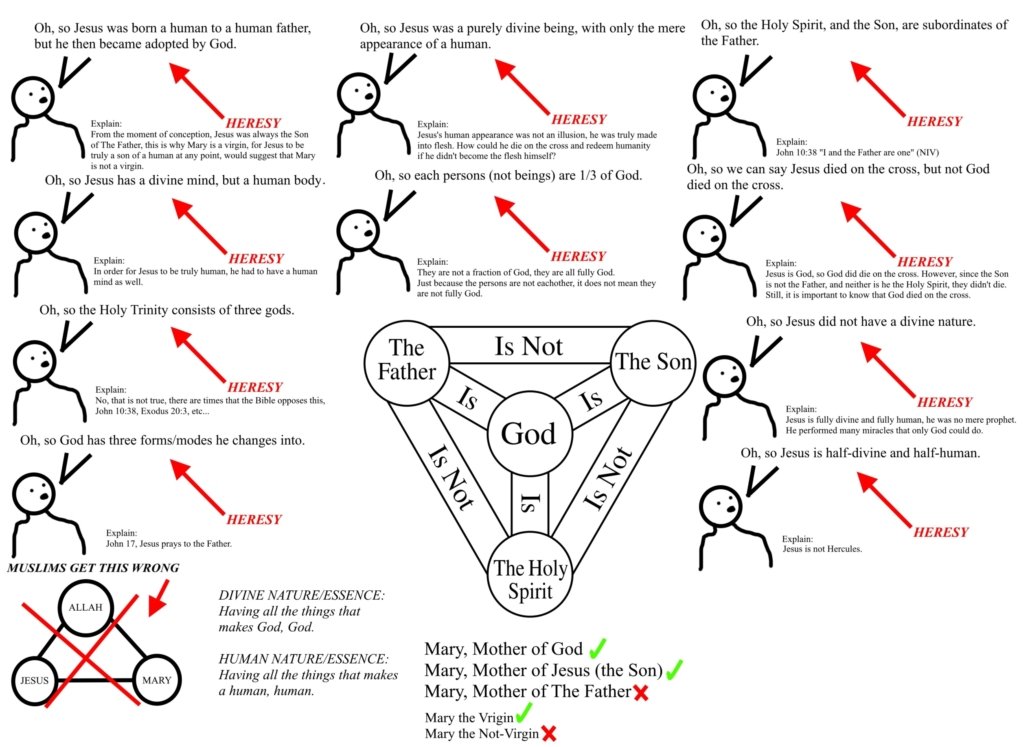
Reforms to Think about Regarding My Model
As the Book of Ben Kathryn states, the Gentiles as well as the LDS church has errored its rigid view and contentions over the Godhood. Even the unique wording of question one in the temple recommend interview seems to wrongly test our belief or view of God as a “social trinity” (or three distinct beings one in purpose but separate in body) as opposed to Judaic, Catholic or Protestant views with differing ideas concerning unity of substance and essence, etc. It seems like the type of divisive question that the early Catholic Arians often forced upon the Monophysites before excommunicating and ostracizing them.
(See the Wikipedia articles on sabellianism/modalism, trinitarianism, or the Nestorian debates to get a grasp on how trite most of our Mormon understandings of the historical Christian concepts of trinity actually are.)
Jewish/Egyptian Emanations of God
(communications from each member of kings court/council)
So the Jewish concept of God was one of ONE single God or HEAD GOD with Sons & Servants constituting ONE COUNCIL or KINGS COURT OR GODHEAD surrounded by various emanations or faces or modes of communication. Three tiers of beings manifesting one invisible essence (see Egyptian Kolbrin verses below)
| KING (God the Father) | PRINCES (Sons of God) | SERVANTS/GOVERNERS (Cherubim, Seraphim, Four Beasts, Angels/Messengers, etc.) |
| Celestial Glory (Heaven) | Terrestrial Glory (Earth) | Telestial Glory (underworld) |
| Holy of Holies (Inner Chamber – Throne Room) | Holy Place (Outer Chamber – Council Room) | Courtyard |
Although the terms for God are widely convoluted in biblical literature, in Jewish Mysticism God is understood as Ein Sof (The Infinite), an utterly incomprehensible, transcendent being or essence that exists beyond all description, but interacts with the universe through ten distinct modes, emanations or “attributes” (as in modes of communication) known as the Sefirot. These Sefirot—act as channels, or “filters,” through which divine energy descends and reveals itself in the created world without in any way dividing or changing the perfect unity of God. While these emanations, particularly the final one (Malchut or Shechinah), represent the immanent Divine Presence active in the world, they are not separate deities and ONLY THE TOP FOUR are considered independent beings (in Christian thought). All are rather instruments of divine will, often likened to light radiating from a single, unchanging source. (Depicted in ancient scripture and Egyptian artwork as wings, arms, hands, scepters, subgods & beasts coming from the one central Sun.)
| Modes of Communication (of the Father/Son) | Meaning & Function (Examples) | Role in the Godhead / Manifestation |
| Shekhinah (The King’s/God’s Presence) | The LORD (Ex. 25:8; Ex. 40:34–35; Ps. 132:13–14) | In addition to traditional God, this is the “feminine” aspect of God that rested in the Tabernacle. It represents God’s proximity to Israel. |
| Ruach HaKodesh (The King’s/God’s Spirit or Projection of Mind) | Divine Breath/Inspiration/thought form! Spirit of the LORD. Indwelling of the LORD. (Ps. 51:11; Isa. 63:10–11; Joel 2:28–29) | The Spiritual Thoughtform that can be sent upon individuals, enabling them to speak or act with divine authority. |
| Zeir Anpi (The King’s/God’s Son) | The “Lesser YHWH”: Isa 9:6, John 10:30, John 14:9, Revelation 21:6–7, Mosiah 15:1–5, Mosiah 16:5, Ether 3:14, Alma 11:38–39, D&C 93:3–4 | Often specifically assigned to Zeir Anpin. This matches the “Temple Theology” of Margaret Barker, where the “Son” is the visible LORD who reveals the invisible “Most High” (El Elyon) |
| Malakh Adonai (King’s/God’s Messenger, angel or servant) | The Sent One. Angel of the LORD. (Gen. 16:7–13; Ex. 3:2–6; Judg. 6:11–23) | A specific messenger who speaks as God and is addressed as God, often seen as God’s “Visible Form.” |
| Metatron (King’s/God’s NAME on a Messenger) | The Prince of the Countenance. (Gen. 5:24 -as Enoch; Ex. 23:20–21; 3 Enoch) | In mystical texts, also the “Lesser YHVH” who bears God’s name and mediates between heaven and earth. |
| Mashiach (King’s/God’s Anointed) | A Messiah, one set apart. (Isa. 45:1, 1 Sam. 16:13/24:6, Psalm 105:15, Luke 4:18, 1 John 2:27, Isa. 61:1) | Note that this title can refer to everything from Cyrus, to David/Saul to believers of Jesus. To give this title rigid ‘personhood’ would be 🙁 |
| Memra (The King’s/God’s Word) | The written “Saying.” (Gen. 1:3; Ps. 33:6; John 1:1 -Greek equivalent. See also 1 John 5:7–8) | Used in the Targums to represent God’s active involvement in the world without making Him “human-like.” (similiar to Spirit) |
| Panim (The King’s/God’s Face) | Divine Countenance. (Ex. 33:14–15; Num. 6:25–26; Ps. 27:8) | Represents God’s favor or direct presence. To see His “Face” is to experience His unshielded essence. |
| Tzelem (The King’s/God’s Image) | Divine Statue, Idol, Temple. (Gen. 1:26–27; Gen. 5:3; Gen. 9:6) | Represents a play on pagan idols of kings & Gods. True god’s ‘image’ or idol is man/adam himself. (let us create him in our image) |
| Yad / Zeroa (The King’s/God’s Hand/Arm) | Divine Power. (Ex. 6:6; Deut. 4:34; Isa. 53:1) | Represents God’s intervention in history, specifically in judgment or the deliverance of Israel (the “Outstretched Arm”). |
| The Sefirot (= King’s/God’s Attributes) | The 10 Attributes. (1 Chron. 29:11; Prov. 3:19–20; Isa. 11:2) | The Kabbalistic “channels” through which God’s light flows into the universe (e.g., Wisdom, Mercy, Justice). |
Biblical Intermediaries (Targumim) or Modes of Communication
Before the Gentile Church arrived, Jewish scripture and tradition (the Targums and early mystical writings) already had a “Complex Monotheism with a host of intermediary beings and modes through which the ONE god communed and communicated with man.” This is likely what the Book of Ben Kathryn suggests Messianic Jews will “restore”:
A few examples (see more complete list above).
The Memra (The Word)
In ancient Aramaic translations of the Old Testament (Targums), whenever God interacts with the physical world, he does so through his Memra (The Word). The Memra is God, yet it is how God “steps out” of eternity into time.
Jewish Correction: Instead of the Greek Logos (which became a philosophical concept), the Hebrew Memra is God’s active, creative voice.
The Shekhinah (The Presence)
Jewish thought identifies the Shekhinah as the indwelling, “feminine” presence of God on Earth. In a Jewish “Trinity,” the Holy Spirit isn’t just a third “person” in a list; it is the Shekhinah—God’s actual, felt presence in the Temple and the heart.
The “Angel of the Lord”
The Old Testament is full of “The Angel of the Lord” who speaks as Yahweh, accepts worship as Yahweh, and is called Yahweh, yet is sent by Yahweh.
The Jewish Insight: This isn’t a “split” in God; it is God’s Messenger-Self. It is the “Face of God” that can be seen, while the “Essence of God” remains hidden.
.
Jewish Syncretisms
Israeli prophets and mystics often appropriated the gods of surrounding cultures in a process known in scholarship as syncretism (the blending of beliefs) or interpretatio graeca/hebraica (reinterpreting foreign gods through one’s own cultural lens).
In many cases, the biblical writers didn’t just “copy” these figures; they engaged in polemic. They would take a famous attribute of a foreign god (like Baal’s ability to ride the clouds) and “attribute” it to Yahweh to argue that Yahweh, not Baal, was the true master of the storm.
Here is a list of prominent examples where Jewish mysticism and biblical texts appear to have appropriated or reframed figures from surrounding cultures (Canaanite, Egyptian, and Mesopotamian).
| Jewish/Biblical Figure | Appropriated From | Original Cultural Context | Similarities and Functions |
|---|---|---|---|
| Yahweh (as Head God) (Ps. 29; Ps. 68:4; Ps. 104:3) | Baal / Hadad / Zues S. Kingom supreme god, Combined by Deuteronomists | Canaanite / Greek (Ugaritic) | Yahweh is described in the Psalms as the “Cloud Rider” (Rokeiv Ba’aravot), a specific epithet of Baal. Both control thunder, lightning, and the “opening of the windows of heaven” for rain. |
| El (Gen. 14:18–22; Gen. 17:1; Ps. 82:1) | El (The Bull) N. Kingdom supreme god, Combined by Deuteronomists | Canaanite | The high father god of the Canaanite pantheon was named El. He was depicted as a benevolent, aged king with white hair. Israelite writers appropriated his name and his role as the “Creator of All” (El Elyon) to identify the God of Abraham. |
| Metatron (Archangel) (Gen. 5:24; Ex. 23:20–21; Ezek. 9:2) | Thoth (and Hermes) Not in Bible, but described as the ‘transformed Enoch’ who was taken up by God) | Egyptian / Greek | Both are the “Scribe of the Gods.” Metatron is the celestial scribe who records the deeds of Israel. Both function as the “Mediator” between the high God and humanity. Metatron is often called the “Lesser YHWH,” similar to Thoth’s role as the representative of Ra. |
| Leviathan (Ps. 74:14; Job 41:1; Isa. 27:1) | Lotan / Litanu | Ugaritic | In Canaanite myth, Lotan is the seven-headed sea dragon defeated by Baal. The Bible reframes Leviathan as a creature defeated by Yahweh at creation or at the end of time to show Yahweh’s dominance over chaos. |
| Wisdom (Chokmah) (Prov. 8:22–31; Prov. 9:1) | Ma’at (and Isis) Also Hagia Sophia | Egyptian | Lady Wisdom in Proverbs 8 is described as being “present at creation” and the “architect” of order. This mirrors Ma’at, the Egyptian personification of cosmic order, truth, and justice who was the first daughter of the sun god Ra. |
| Cherubim (Gen. 3:24; Ex. 25:18–22; Ezek. 10:1–22) | Lamassu | Assyrian / Babylonian | The biblical Cherubim are hybrid beings (man, lion, ox, eagle). These are direct parallels to the Lamassu—the winged, human-headed bulls that guarded the palaces of Mesopotamian kings. |
| Lilith (Isa. 34:14) | Lilitu / Lamashtu | Mesopotamian | Originally a class of wind-demons or “night monsters” in Sumerian and Akkadian lore that preyed on infants. Late Jewish folklore associated her as the rebellious first wife of Adam. (representing mankind) |
| Resheph (Hab. 3:5; Job 5:7; Ps. 78:48) | Resheph | Canaanite / Egyptian | Originally the Canaanite god of plague and war. In Habakkuk 3:5, “Resheph” (translated as “burning heat” or “pestilence”) is personified as a servant walking at the feet of Yahweh as He marches to war. |
| Satan (The Accuser) (Job 1:6–12; Zech. 3:1–2; 1 Chron. 21:1) | Shai (or Angra Mainyu) | Egyptian / Zoroastrian | While the “Satan” figure evolved, his role as the “prosecutor” in the divine council mirrors the Zoroastrian “Adversary” (Angra Mainyu) and the Egyptian concept of Shai (Destiny/Judgment) who weighs the heart. |
| Michael (Archangel) (Dan. 10:13; Dan. 12:1; Rev. 12:7) | Marduk / Mithra | Babylonian / Persian | Michael is the “Prince of Israel” and the dragon-slayer (Rev 12), mirroring Marduk’s defeat of the chaos-dragon Tiamat and Mithra’s role as the protector of the cosmic covenant and warrior against darkness. |
| Gabriel (Archangel) (Dan. 8:16; Dan. 9:21; Luke 1:19–26) | Nabu / Hermes | Babylonian / Greek | Nabu was the Babylonian god of writing and wisdom, acting as messenger for Marduk. Gabriel’s role as the “Revealer” and messenger of God mirrors Nabu’s function and the Greek Hermes as the divine herald. |
| Raphael (Tobit 3:17; Tobit 12:15) | Asclepius / Hermes | Greek | Raphael is the “Healer of God.” He shares the healing function of Asclepius (god of medicine) and the role of the “guide of travelers” associated with Hermes. In the Book of Tobit, he acts as a divine guide. |
| Uriel (2 Esdras 4:1; 1 Enoch 9:1) | Shamash / Apollo | Babylonian / Greek | Uriel (“Fire of God”) is the angel of light and wisdom. This aligns with Shamash, the sun god associated with justice and light, and Apollo, the god of truth, light, and prophecy. |
| Remiel (Jeremiel) (2 Esdras 4:36; 1 Enoch 20:8) | Anubis / Hermes | Egyptian / Greek | Remiel is the archangel of hope and the “guide of souls” in the afterlife. This is a direct parallel to the Psychopomps (soul-guides) like Anubis, who weighs the heart of the deceased, or Hermes Psychopompos. |
| Raguel (1 Enoch 20:4) | Nemesis / Shamash | Greek / Babylonian | Raguel is the “Friend of God” who executes justice on the stars and angels. He functions as a divine enforcer of balance and order, much like the Greek Nemesis (retribution) or the judicial role of Shamash. |
| Sariel (1 Enoch 20:6) | Sin / Thoth | Babylonian / Egyptian | Sariel is often associated with the cycles of the Moon and lunar secrets. This parallels the Babylonian moon god Sin or Thoth in his aspect as the measurer of time and the lunar calendar. |
How the Traditional Trinity or LDS Godhead is “Wrong”
A restored Jewish perspective on god will bring:
- Stop counting, start experiencing: Traditional Trinitarianism gets bogged down in the math of “3=1.” The Jewish view focuses on the authority of the Father acting through the agency of the Son by the power of the Spirit. It’s a chain of command, not a committee.
- Remove the “Greek Masks”: The word “Person” (persona) comes from the theatre—it implies a mask. Jewish culture prefers the term “Spirit”, “Name” or “Face.” God has many “Names” (Elohim, Yahweh, El Shaddai), but they are all the same “One.”
- Humanity as the Bridge: A Jewish view sees the Messiah (the Son) not as a “divine substance” that joined a “human substance,” but as the Perfected Man who is the physical Tabernacle for the fullness of the One God.
.
Summary of Views
So my view is that early Israel (as expressed in early scriptures like Psalm 82:1, Job 1:6 & Job 38:4–7) had a view similar to that of the Egyptians from which they sprang or Babylonians as laid out in the Kolbrin & The Bundahišn Zoroastrian Book of Creation. Which was that there was an invisible formless god, made manifest through a head god of a king’s court or divine council of God, ‘Sons of god’ and Servants/governors or luminaries. (Pharaohs and leaders being very Sons of god). However, this view was reformed by Moses/Elijah/Akhenaten/etc. Teaching a stricter form of monotheism which was only temporarily taught in Egypt, but institutionalized in a persistent manner in Israel by Hezekiah, Josiah & Ezra. This view was standardized and institutionalized and convoluted by the Deuteronomists.
The Kolbin seems to support the idea that Ezra ‘combined’, in a way, the concepts that the Northern Kingdom and common Rabbi’s had for God (El) and that which the Priests of the temple had of God (YWHW), and almost in a compromise or Syncretism settled on a combination of the two as LORD God (YHWW El).
SOF:4:3 The congregation with Amos were the Children of Light and the people were Kenim [kohanim] who worshipped Yawileth [YHWH], and Galbenim (rabbanim) who worshipped Eloah [Elohim]. But Amos taught the people to walk in the light of Truth and said, “To each of you his own god, but above any god which can be named is something that cannot be named, and you shall know it as The Supreme Spirit.” (The Kolbrin, Sons of Fire, 4:3)
Summary Table: The Path to Strict Israelite Monotheism
| Figure/Source | Role in the Framing | Key Theological Shift |
|---|---|---|
| Elijah (the Zealot Prophet) | Prophetic Activist. Fights the priests of Ba’al on Mt Carmel & wins Kings & Pharaohs support. | Monolatrist: Doesn’t argue that Ba’al doesn’t exist; he argues that Ba’al is useless and that YHWH is the only god Israel should serve |
| Hezekiah | Political Precursor. Centralization of worship to Jerusalem. | Began the process of “cult centralization.” He removed the “high places” (local altars) and broke the bronze serpent (Nehushtan) |
| Josiah (D. Source) | The Deuteronomic Reform: Removal of the Mother Goddess and other deities. | Leads violent purge of the Temple, removing the poles of Asherah, the houses of the male cult prostitutes, and the altars to Ba’al and the “Host of Heaven” (the stars). |
| P (Priestly Group) | Exilic Theologians, rewrote the Creation story (Genesis 1) | Universalism: Hold God as the sole creator of the universe. De-mythologized scripture & universe. (removes the sea-monster) |
| Ezra (R. The Finisher) | Final Editor. His group of priests recompiles & codifies much of the current bible. | Legalism: Ezra is often identified by scholars as the Redactor (R) or the one who brought the final, unified Torah back from Babylon to Jerusalem (c. 458 BCE). |
LDS scholars such as Dan McLellin and Blake Ostler have been reconnecting LDS concepts to the original Hebrew texts and ancient interpretations to create new, less rigid frameworks for interpreting the God Head. Blake Ostler effectively argues that Joseph Smith followed early gnostic ideas taught in the Apocryphon of John & Tripartite Tractate to equate the Hebrew concept of ‘Spirit’ with Greek and modern concepts of ‘Mind’. By calling the Spirit “the Mind,” Joseph Smith solved the philosophical problem of ‘How can two separate physical beings (Father and Son) be “one God”? He suggests, They aren’t one in body, but they are one in Logos or Mind/Spirit. Thus the Holy Breath or Spirit of God is an emanation which invisibly unifies otherwise separated entities. Much like the wind unifies the movement of trees or waves from the sea unify rocking boats or waves from a tuning fork unify humming bells, God’s mind or SPIRIT, or even the telestial class of SPIRIT beings act to unify the beings of the divine council. (Father, Sons, Angels, Cherub, Seraph, ects)] This logic follows the gnostic ideas of the Gospel of Phillip were it says “”The Father” and “the Son” are single names; “the Holy Spirit” is a double name. For they are everywhere: they are above, they are below; they are in the concealed, they are in the revealed. The Holy Spirit is in the revealed: it is below. It is in the concealed: it is above.” (3rd century, Gospel of Phillip of the Nag Hammadi Library)
Below is a summary of the views of Blake Ostler, Dan McClellan & Margaret Barker on the concept of LORD God or unity of God in the bible. We should lean on new renewed ancient “Jewish” ideals of godhood that are starting to be taught by authors like Blake Ostler (books/youtube), Dan McClellan (books/youtube), and Margaret Barker (books/youtube), but at the same time we should NOT get weighed down or attached to dogma that puts narrow definitions on the nature of God which lead to division!
- Dan McClellan (Historical-Critical): Focuses on Evolution. He argues that Yahweh and El were originally two different gods in a pantheon (Father and Son/Subordinate). Over centuries, they merged into one single character. He views “LORD God” as a linguistic fossil of that merger, not a reference to two distinct living persons in a Godhead.
- Blake Ostler (Philosophical/LDS): Focuses on Unity of Will. He accepts the historical distinction but argues it represents a “Social Trinity.” To him, Yahweh (the Son/Jesus) is the God of Israel who speaks for and embodies Elohim (the Father). “LORD God” is the title of the Son acting with the Father’s full authority.
- Margaret Barker (Temple Theology): Focuses on Restoration. She argues that the first Christians weren’t inventing something new; they were returning to the “First Temple” theology where Yahweh was the High Priest/Son of the High God (El Elyon). She believes “LORD God” refers specifically to the Son (the Angel of the LORD) who manifests the invisible Father to humanity.
| Feature | Dan McClellan (Historical-Critical) | Blake Ostler (LDS Philosophical) | Margaret Barker (Temple Theology) |
| Primary Framework | Secular/Historical Evolution | Social Trinitarianism (LDS) “Monarchical Monotheism” | Pre-Christian “First Temple” Religion |
| Book / Writings | YHWH’s Divine Images: A Cognitive Approach, | Exploring Mormon Thought: Of God and Gods | The Hidden Tradition of the Kingdom of God |
| Who is “LORD” (YHWH)? | A distinct deity who was later “promoted” to the top. | The pre-mortal Jesus Christ (The Son). | The Son of God and the Great Angel. |
| Who is “God” (El/Elohim)? | The original Canaanite High Father god. | The Eternal Father (El). | The Most High God (El Elyon). |
| Is the Son distinct from the Father? | Historically, yes (as two different gods); later, no (merged into one). | Yes, as two distinct persons in one Godhead. (Beni Elohim) | Yes, the Son is the visible “LORD” who reveals the invisible “God.” |
| Meaning of “LORD God” | A linguistic merger of two previously separate gods. | The Son (Yahweh) acting with the Father’s (Elohim) authority. | The Son/High Priest appearing in the name of the Most High. |
| Terminology for Gods manifestations | images or ‘agents of God’s own personhood’ (video#1, video#2, video#3– get times) | names or ‘kingships’ of God? (presentation#1, presentation#2) | visible manifestation of the invisible El Elyon |
| View of Monotheism | Monotheism was a late development/invention. | Monotheism is “Unity of Heart/Mind,” not “Numerical Oneness.” | Monotheism was a “distortion” by the later reformers (Deuteronomists). |
.
Ancient Texts & Channeled Scripture on the Godhead
The Law of One on the Unity of God
The Law of One may be one of the most elegant descriptions of a social trinity which harmonizes some of the arguments made by the above authors on plurality vs unity of God. In its opening chapter it summarizes what it says was the view of some of the higher beings who reveal God to mankind. Beings who have been exalted to a state of unity called a ‘social memory complex’ or a type of group consciousness that no longer dwells in a physical or spiritual world bound by time.
1.7 Ra: Consider, if you will, that the universe is infinite. This has yet to be proven or disproven, but we can assure you that there is no end to yourselves, your understanding, what you would call your journey of seeking, or your perceptions of the creation.
That which is infinite cannot be many, for many-ness is a finite concept. To have infinity you must identify or define that infinity as unity; otherwise, the term does not have any referent or meaning. In an Infinite Creator there is only unity. You have seen simple examples of unity. You have seen the prism which shows all colors stemming from the sunlight. This is a simplistic example of unity.
In truth there is no polarity for all will be, as you would say, reconciled at some point in your dance through the mind/body/spirit complex which you amuse yourself by distorting in various ways at this time. This distortion is not in any case necessary. It is chosen by each of you as an alternative to understanding the complete unity of thought which binds all things. You are not speaking of similar or somewhat like entities or things. You are every thing, every being, every emotion, every event, every situation. You are unity. You are infinity. You are love/light, light/love. You are. This is the Law of One.
May we enunciate this law in more detail? (Law of One, Session 1)
1.1 We, too, have our place. We are not those of the Love or of the Light. We are those who are of the Law of One. In our vibration the polarities are harmonized, the complexities are simplified, and the paradoxes have their solution. We are one. That is our nature and our purpose… We are not a part of time and, thus, are able to be with you in any of your times.
1.5 Ra: The identity of the vibration Ra is our identity. We as a group, or what you would call a social memory complex [or exalted group-consciousness], made contact with a race of your planetary kind which you call Egyptians.
Also of interest are the verses in the ancient Egyptian scroll section of the KOLBRIN which explain how the Egyptians (and Hebrews by extension) actually saw the distinction between The Most High God and lower emanations of God.
The Kolbrin (specifically in the Egyptian scrolls like the Scroll of Masters and the Scroll of Creation) explicitly makes the claim that Egyptian “polytheism” was a misunderstanding by the uneducated masses, whereas the priesthood understood all “gods” to be facets of a single, supreme Creator.
This concept is often referred to in the text as the “One God of the Secret Name” or the “Hidden One.”
Key Verses and Concepts from The Kolbrin
While the book is divided into many small verses, the most direct explanation of this “Monotheism behind Polytheism” is found in the Egyptian Book of the Masters:
- The Many as Attributes of the One: The text states that the “gods” are merely names given to the various powers and attributes of the Supreme Being.“Men speak of many gods, but they are only names for the powers of the One. The many are but as the fingers on a hand or the beams from a sun.” (Paraphrased from the Scroll of the Masters).
- The “One without a Second”: In the Scroll of Creation, the text describes a singular, eternal source that existed before everything else.“In the beginning, there was only the One, the Uncreated, the Self-Sustaining… He is the Hidden One, whom no man knows by his true name, for to name Him is to limit Him.”
- The Priesthood vs. The People: The Kolbrin explains that the “images” and “idols” were used as teaching tools for those who could not grasp the abstract nature of a single, infinite God.“The wise know that God is one, but the foolish need many images to focus their wandering minds. Thus, the attributes of the One were given form, that the ignorant might have something to grasp.”
The following (and many more ancient Egyptian Kolbrin scrolls) can be searched out at this link.
CRT:1:3 Before the beginning, there was only one consciousness, that of The Eternal One whose nature cannot be expressed in words. It was The One Sole Spirit, The Self Generator, which cannot diminish, The Unknown, Unknowable One brooding solitary in profound pregnant silence. CRT:1:4 The name which is uttered cannot be that of this Great Being (Tao, v.1) who, remaining nameless, is the beginning and the end, beyond time, beyond the reach of mortals, and we in our simplicity call it God. CRT:1:5 He who preceded all existed alone in His strange abode of uncreated light, which remains ever unextinguishable, and no understandable eye can ever behold it. The pulsating draughts of the eternal life light in His keeping were not yet loosed. He knew Himself alone; He was uncontrasted, unable to manifest in nothingness, for all within His Being was unexpressed potential. (The Kolbrin, Creation Scroll 1:3-7)
SOF:4:3 The congregation with Amos were the Children of Light and the people were Kenim [kohanim] who worshipped Yawileth [YHWH], and Galbenim (rabbanim) who worshipped Eloah [Elohim]. But Amos taught the people to walk in the light of Truth and said, “To each of you his own god, but above any god which can be named is something that cannot be named, and you shall know it as The Supreme Spirit.” (The Kolbrin, Sons of Fire, 4:3)
MPR:2:1 There is but one God, the High God, the Designer, the Creator and Ruler of the Earth and the Lord of the Kingdoms of Light and Darkness. Everlasting, All Powerful and beyond the understanding of men. The Great Dweller in Everlasting Pregnant Silence, Unseeable, Unknowable. MPR:2:2 By a command He created man, and in His indulgence permitted the gods to be fashioned. He is the Source of all that is, the Father of Fathers, the Mother of Mothers, the One Who preceded the sun. The sun is not God, though His creation, for its brightness bestows light and life upon the Earth… It is the instrument of the High God, His furnace fire of life. The sun is removed from man at night time, but the True God is always with him. Man never walks alone; he is never unescorted. MPR:2:3 To this God alone give praise, Self-Created, Maker of Heaven and Earth, Founder of the Kingdoms of Light and Darkness… (Kolbrin, Morals & Precepts. Scroll of the Nature of the True God)
MAN:33:7 … Before creation commenced there was the One Father/Mother Being and from this Divinity came the heavenly Twins. From these were born three, and the three became many. MAN:33:8 The Originating Divinity is called many names among men, and in Egypt His names are hidden in other names. Among the Chosen Ones, He is called The Craftsman Creator, but men and women name Him differently among the people. Likewise, some say ‘Him’ while others say ‘Her;’ it is all alike, for these are no more than the words and distinctions of mortal man. Heaven is the sphere of God, the true abode of His Spirit in essence. There is the Heaven above, which is the High Heaven, and the Heaven below, which is the reflection of the High Heaven. The true Centre of God is in Newit.
MAN:34:44 The new form of worship introduced by this Pharaoh [Nabihaton] was simple enough… Behind the symbols and ceremonial, the Pharaoh worshipped the [ONE] Spirit behind the Sun, the Spirit of Light and Life as a direct, fully conscious member outflowing from The Great God Behind All. The king, however, being cut off in the midst of his instruction, perceived the road but dimly… [and revealed Sacred Mysteries, kept hidden by the Enlightened Ones and the Twice Born to the common masses.] (Manuscripts 34, Annexed Scroll Two)
GLN:2:14 “Men call on many gods, though above all there is but One; yet whatever they call Me, I will hear them, for I am The God Above Names, The God Embracing All Names. Whatever men believe, if it serves Good, it serves God. But gold necklaces are not for sheep and outward forms of worship must suffice for the spiritually undeveloped. The rituals of men may often be empty ceremonials, but they may also guard the Great Mysteries behind them.” (Scroll of Gleanings, Kolbrin)
MAN:11:15 Men say, “There are many gods, therefore which among them shall we worship? We cannot know.” They are confounded by their own foolishness, for choice is easy… MAN:11:16 The pillars of all wisdom [counsel or emanations of God] are numbered as the fingers upon a hand… MAN:11:17 The Earth at his feet, the Heavens above, The Great God of gods or the unreal gods of men…
OGS:8:21 … Great Gods, old and new, hasten the day! (There is but One God, but men view Him differently, through their own deceptive eyes, in many aspects, and He appears to them to be many).
SOF:19:10 The barbarians make images of God to make Him more understandable. Are we much better, who make images of Him in our likeness within our thoughts?
SCL:10:8 O Watchers, announce to the Lords of Light and to the Lords of Darkness that I am one, who has penetrated the Mystic Veil but is destined to return to the Realm of Heaviness. O Watchers, announce that I am now a self-knowing everlasting spirit. O Father of the Gods, who is above all, issue the decrees of fate, which ensure that henceforth, I live a life of service, that I may live purposefully when I return to fulfil my destiny.
GLN:2:14 “Men call on many gods, though above all there is but One; yet whatever they call Me, I will hear them, for I am The God Above Names, The God Embracing All Names. Whatever men believe, if it serves Good, it serves God. But gold necklaces are not for sheep and outward forms of worship must suffice for the spiritually undeveloped. The rituals of men may often be empty ceremonials, but they may also guard the Great Mysteries behind them.”
GLN:8:6 “ You say your God is approachable by anyone. Does this enhance His stature? Which is greater, the ruler who judges disputes between swineherds and listens to their complaints, or the ruler who appoints effective officials to deal with swineherds? Surely the former rules amid chaos while the latter rules with efficiency. Do not both of us believe, as all men believe, that there is One Great God above all gods, but we believe that being so great, this Being is beyond approach by mere mortals. Only in this do we differ, you and I.” GLN:8:7 Hurmanetar [Gilgamesh] answered her, saying, “I know him not as He is; all I know is that He exists.
GLN:10:7 God answered Hurmanetar, saying… GLN:10:8 “You call upon Me as the Father of the Gods, nor do you err in this. Yet I am the Hidden God, the God of Secret Manifestation, the Wronged God, the Betrayed God, the Disappointed God. I am the God who sought to give love Divine to men by making them My heirs, making them partakers of divinity, co-creators with Me.GLN:11:16 ‘There are three great spheres, and that containing the Earth is held together by the Great Glow outflowing from the God of Gods. That part of the Great Glow, which is light and contains life is called Manah, while that which is heavy and contains the flesh of things of the Earth is called Manyu.”
GLN:11:17 “The One Who is the God of Gods is so great that He cannot be defined in the speech of men. Neither can they conceive Him in their thoughts, for He is beyond their understanding. Mortal man has limitations; therefore,let men conceive Him as they will. It is of no importance, providing their conception serves both His purpose and the glorification of man.” GLN:11:18 “Man is not yet great, and until he becomes so it is well that he worship the many Godforms conceived within his thoughts, providing they be such as tend to raise him above himself. Nor do ritual and worship do harm of themselves, unless they, too, thickly overlay the truth so it is buried from sight. Ritual and outward forms of worship can be aids to purification of thought and provide a kind of sustenance for the Lord of the Body. What are the Lesser Gods beloved by unawakened men but thought-conceived friends and guides? Yet, this is a dangerous path men tread, balanced between light and darkness. Therefore, when man wanders towards the abyss of darkness, reveal a little more light, that he may see and so return to the path. Beware, too, lest he follow gods that are false guides and would lure him into the quicksand of carnality, or into the wilderness of ignorance.”
MAN:33:7 … Before creation commenced there was the One Father/Mother Being and from this Divinity came the heavenly Twins. From these were born three, and the three became many. MAN:33:8 The Originating Divinity is called many names among men, and in Egypt His names are hidden in other names. Among the Chosen Ones, He is called The Craftsman Creator, but men and women name Him differently among the people. Likewise, some say ‘Him’ while others say ‘Her;’ it is all alike, for these are no more than the words and distinctions of mortal man. Heaven is the sphere of God, the true abode of His Spirit in essence. There is the Heaven above, which is the High Heaven, and the Heaven below, which is the reflection of the High Heaven. The true Centre of God is in Newit.
MPR:2:1 There is but one God, the High God, the Designer, the Creator and Ruler of the Earth and the Lord of the Kingdoms of Light and Darkness. Everlasting, All Powerful and beyond the understanding of men. The Great Dweller in Everlasting Pregnant Silence, Unseeable, Unknowable… MPR:2:17 He is the Creator, in whose Spirit image and likeness, you were fashioned. His laws ordained your present estate and circumstances upon Earth. The power of your intellect is His promise of godhood, and the marvels of your body are the works of His hand. His soul communes with your soul, and the consciousness He shares with you is the source of your life… MPR:2:24 He sits enthroned in the universal centre, and the divine rays, which flow from His presence, hold all forms in stability. He moves His finger in the nightskies, and the stars dance along their pathways. He walks upon the wings of the wind and encompasses all the kingdoms of Heaven and Earth… MPR:2:32 However, for men in general, the Undiscovered God is not apparent. He has no man-made image in His likeness, and He stands in obscurity behind the great alcove beyond the temple within the Place of Flame. Yet, He makes Himself known in subtle ways, for He cannot remain unmanifested to the truly spiritual, any more than a river can remain hidden, for it dissolves away the ground, in which it is concealed. So will the Great God spring forth in the midst of material things and, dissolving away their solidity, shine forth to the sincere seeker… MPR:3:17 The gods of the North and South provide food for the body of man, but it is the God of All Ages, who provide sustenance for the soul. As the body has its particular foods, which nourish it, so has the soul. As the body is impoverished by lack of proper sustenance, so is the soul.
An example of quotes from 300’s BC from Greek historian theopompus showing their tradition of considering stars or zodiacs ‘gods’ as well as ‘attributes gods.
They have also many stories to relate concerning the gods, for example that Horomazes… created six gods, the first three deities respectively of good-will, truth, and orderliness, the others of wisdom, wealth, and a good conscience. By the latter rivals as it were to these were formed of equal number. Then Horomazes extended himself to thrice his stature as far beyond the sun as the sun is beyond the earth, and adorned the heaven with stars, appointing one star, Sirius, as guardian and watcher before all. He made also other twenty-four gods and placed them in an egg, but Areimanius produced creatures of equal number and these crushed the egg . . . wherefore evil is mingled with good. At the appointed time however Areimanius must be utterly brought to nought and destroyed by the pestilence and famine which he has himself caused, and the earth will be cleared and made free from obstruction, the habitation of a united community of men dwelling in happiness and speaking one tongue. Theopompus further reports that according to the magi for three thousand years in succession each of the gods holds sway or is in subjection, and that there will follow on these a further period of three thousand years of war and strife, in which they mutually destroy the works of one another. Finally Hades will be overthrown, and men will be blessed, and will neither need nourishment nor cast a shadow. And the deity who has accomplished these things will then take rest and solace for a period that is not long, especially for a god, and moderate for a sleeping man. To this effect then is the legendary account given by the magi. (Plutarch ca. 100 A.D. Cumont, ii, p.33-36, De Iside et Osiride, ch. 46. Theopompus lived in the 4th c. B.C.)
Connection to Historical “Henotheism”
Your observation actually aligns with a real-world Egyptological concept called Henotheism or Monolatry.
- The “Ba” of God: Many genuine ancient Egyptian hymns (like the Great Hymn to Aten or the Hymns to Amun) describe the various gods as the “Bas” (manifestations or souls) of a single, hidden deity.
- The Kolbrin’s Perspective: The Kolbrin takes this a step further by framing it as a “Secret Wisdom” that was lost or corrupted over time.
This perspective in the Kolbrin is very similar to the “Hermetic” traditions that emerged later, which also claimed that ancient Egyptian religion was a deeply philosophical monotheism hidden behind a mask of animal-headed deities.
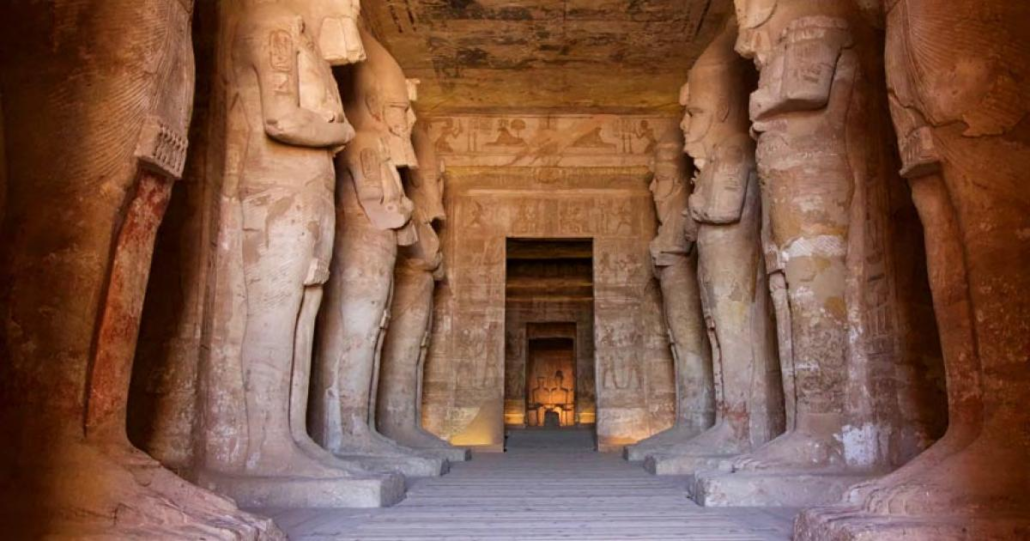
Example of the aspects of God taught in the Egyptian Temple Ceremony, as described in the Kolbrin Egyptian Texts.
SOF:2:1 These things must not be entrusted to common folk; neither must they be degraded by disclosing them to such as would profane them… SOF:2:2 This is one among the Lesser Mysteries, the Ritual of the Twice Born. It is a ceremony to regain spiritual vigour and to restore spiritual power, whereby a Chosen One dies and rises again. It is a grim undertaking fraught with danger. It is not for the spiritually weak or for the faint-hearted. Not all survive to walk again upon the friendly ground of Earth. SOF:2:3 Only the older men who had completed the three cycles of seven years were accepted… SOF:2:4 The Tree of Life has many branches, and that which is initiation…began in that far away glorious period before the days of wickedness.
SOF:2:9 when Ramsis built the Great Temple of Ra-amen, it contained within itself both temple and shrine of the All Highest God. Also, there were Caverns of Initiation underneath. In the hall of the temple, which faced East and West…In the ceiling above the candidates was the symbol of the sun, and from it extended seven hands. This represented the sun of life, dispensing the vitalising forces of life from their fount within the circle of creative consciousness. Behind the priest were representations of the ten rays of power that flowed out from the All Highest God when He created Earth, and which became the attributes of His Spirit. They are: Love, Foresight, Wisdom, Insight, All Knowledge, Strength, Resolution, Justice, Mercy and Courage. SOF:2:10 Between the Devoted Priest and the wall behind him was the triangular representation of the three Sublime Essences – Supreme Spirit, (embodied) Soul Spirit and (pre-existent) Forming Spirit – the three parts of Spirit ever in unity.. The entrance to the sanctuary was in the East, and above this was a representation of the Great Eye, the secrets of which cannot be written. Before the Devoted Priests was a hidden doorway, and this led down to the Marriage Chamber. In this chamber were performed the rites known as The Marriage of the Soul.
SOF:2:12 Cut on the walls were representations of Life and Spirit. The candidate had studied with the priests of the upper temple for seven years and been observed by one of the Twice Born for seven years. Now, here in the antechamber, he became an Anointed One. [The rest of this chapter gives a detailed description of the Temple Initiation Ritual] (The Kolbrin, Sons of Fire, Chapter 2)
.
Scriptures from the Gnostic Pearl & Nag Hammadi Library
Here’s a few more verses from The Gnostic Bible or Expanded Gnostic Writings that echo Brigham’s
2 Father and Son are single names, but Holy Spirit is a double name. Father and Son are above, but Holy Spirit is above and below. Father and Son are personally present above, but they are present through Holy Spirit above and below. (Principles of the Covenant ch.8:2, Gospel of Phillip, Nag Hammadi)
3 The Father is the Only Begotten of the Father. The name of the Father is the Son. The name of the Son is the Father (9:3)
3 There is a name which mortals do not use unless they have been enlightened; it is the name of the Father, which the Parents have given to the Son, for the Son could not become Father unless he bears the name of the Father. Those who know this name do not use it freely, for the names of Deity are sacred, filled with power, and this name is the most sacred of all. (3:3)
3. How did the Lord Jesus reveal himself to us in this mortal realm while he taught here? He lived here as a mortal, although he revealed himself to be the Son of the Eloheim. We say he lived among us, teaching the principles of the Heavenly Father and the Earthly Mother, but this mortal existence is more death than life. While he revealed himself as Son of the Eloheim, he also declared himself to be Son of Man, for his Father is Divine Anthropos, and the Son is preeminently human, as well as divine. He embraced both humanity and divinity within himself, so that he could die as a human, but vanquish death as a God. He came from a higher plane; he was the Son of a God. In fact, he, himself, was a God before this physical realm was organized. 4. This seems difficult to understand to the mortal mind, but when we have put on the mind of Christ, it all becomes clear. There is nothing difficult to understand in the Word of Truth, but we must first put on the mind of Christ, the Holy Spirit, so that we no longer think as mortals, but as the children of the Eloheim. (Mystery of the Resurrection, Nag Hamadi Library)
.
Oahspe on the Name Jehovah (YHWH)
The Book Oahspe gives a detailed description of how the earliest prophets named the creator or highest god.
04/1.1. All was. All is. All ever shall be. The All spoke, and Motion was, and is, and ever shall be; and, being positive, was called He and Him. The All Motion was His speech.
04/1.2. He said, I AM! And He comprehended all things, the seen and the unseen. Nor is there anything in all the universe that is not part of Him.
04/1.3. He said, I am the soul of all; and all that is seen is part of My person and My body.
04/1.4. By virtue of My presence, all things are. By virtue of My presence, life is. By virtue of My presence, the living are brought forth into life. I am the Quickener, the Mover, the Creator, the Destroyer. I am First and Last.
04/1.5. I am two apparent entities, nevertheless I am only One. These entities are the Unseen, which is Potent, and the Seen, which is of itself Impotent, and called Corpor.
04/1.6. With these two entities, in likeness of Myself through them, I made all the living; for as the life is the potent part, so the corporeal part is the impotent part.
04/1.7. Chief over all that live on the earth I made Man; male and female I made them. And, so that man could distinguish Me, I commanded him to give Me a name; by virtue of My presence I commanded him. And man did not name Me after anything in heaven or on the earth. In obedience to My will he named Me after the sounds the wind utters, and he said, E—O—Ih! Which is now pronounced Jehovah, and is written thus (Oahspe, Book of Jehovah, ch.1)
.
THE NAME OF THE FATHER AND SON IS THE SAME (YHWH)
The Son” is not just a title, but the literal, physical manifestation of the Father’s “Name” (his essence and power).
“Keep them in thy name, which thou hast given me.” (John 17:11)
“What is his name, and what is his son’s name?” (Psalms 30:4)
1. In the Gnostic Bible (Nag Hammadi)
The most direct and detailed explanation of this is found in The Gospel of Truth (attributed to Valentinus, c. 140–180 AD). It contains a long, mystical treatise on the relationship between the Name and the Father.
“Now the name of the Father is the Son. It is he who first gave a name to the one who came forth from him, who was himself, and he begot him as a son… The name, therefore, is that of the Father, as the name of the Father is the Son.” (Gospel of Truth 38)
- The Logic: The Gnostics believed the Father was “The Ineffable One” (The Most High) and had no name because he was above all things. To interact with the universe, he “spoke” his own name, and that spoken word became the Son.
- The “Invisible” Father: The Son is the “face” or the “audible name” of the otherwise invisible and silent Father.
2. In the Early Church Fathers
The “Orthodox” Church Fathers also wrestled with this. While they eventually moved toward the Trinitarian definition (Three Persons, One Essence), many early writers spoke of the Son as the “Name” of the Father in a way that sounds remarkably Gnostic or “Oneness” in nature.
St. Ambrose of Milan
Ambrose was very explicit about the unity of the Name. He argued that the “Name” referred to in the baptismal formula (Matthew 28:19) is singular because the Father and Son share it.
“So, then, the Name of the Father is not one, that of the Son another… the Name of the Father and of the Son is one.” (On the Holy Spirit, Book I, 13:132)
Clement of Alexandria
Clement often described the Son as the “face” or the “Name” of the Father. He viewed the Son as the localized expression of the infinite Father.
- He taught that the Son is the “Name of God” which Moses and the prophets encountered in the Old Testament. When YHWH spoke, it was the Son (the Name) speaking on behalf of the Father.
Pseudo-Priscillian (The Treatise on the Trinity)
This 4th-century text explicitly quotes the Gnostic idea as if it were a common apostolic proverb:
“For the apostle says, the name of the Father is the Son, and likewise that of the Son is the Father.”
THE ONE LIKE UNTO & SIMILITUDE LANGUAGE
In biblical visions, the two closely related terms “in similitude of” or “one like unto” are both used respectively to represent (1) a physical resemblance, or an exact facsimile, copy or image and (2) a visionary resemblance of a human or a specific being, that is a heavenly representation of that person.
Similarities in Usage
- Visionary Representations: Both phrases are used to describe divine visions. When Daniel saw “one like unto a Son of Man,” it was a vision (a similitude of) the actual being.
- Shadow vs. Reality: Both concepts are used to describe a “type” or shadow in the Old Testament that represents a higher reality or future event (e.g., the Law of Moses as a similitude of Christ).
- Physical Form: Similitude can refer to “the form itself,” just as “one like unto” describes the form or appearance of a being.
- Similitude often emphasizes the type/shadow relationship (a symbolic representation), such as animal sacrifices being in “similitude” of Christ’s sacrifice.
- One Like Unto often emphasizes the visual, personal resemblance of a person or divine being, especially in prophetic visions.
Daniel 7:13: “One like unto the Son of man” indicates a heavenly figure who resembles a human (messianic figure).
Numbers 12:8: “The similitude of the LORD shall he behold” refers to the form or pattern in which God appears to Moses.
Revelation 1:13: “One like unto the Son of man” describes the glorified Christ, using similar visual language.
Abraham 3:22, 24: Mentions one “like unto God,” indicating a premortal, divine person.
23 Behold, I am he of whom Moses spake, saying: A prophet shall the Lord your God raise up unto you of your brethren, like unto me; him shall ye hear in all things whatsoever he shall say unto you. And it shall come to pass that every soul who will not hear that prophet shall be cut off from among the people. (3 Ne 20:23, Deut 18:15, Acts 3:22, 1 Ne 22:20)
40 He quoted also the third chapter of Acts, twenty-second and twenty-third verses, precisely as they stand in our New Testament. He said that that prophet was Christ; but the day had not yet come when “they who would not hear his voice should be cut off from among the people,” but soon would come. (JS History 1:40)
The ONE LIKE UNTO, is not necessarily saying it IS NOT the person its obviously referring to (God/Christ/Adam), it’s saying I saw a “visionary representation” of the invisible God that we’re not supposed to be able to see WITHOUT DYING!
But note, THERE ARE THREE LIKE UNTO’S. Like unto the son of Man/Adam, Like unto Moses, Like unto God. These are all images.
3 Who being the brightness of his glory, and the express image of his person… (Hebrews 1:3)
43 Because he (Seth) was a perfect man, and his likeness was the express likeness of his father, insomuch that he seemed to be like unto his father in all things, and could be distinguished from him only by his age. (D&C 107:43)
.
This is a backstory in the Mentinah Archive of the Creation/Temple Drama. But what does it really add? That the Holy Ghost is an eternal, uncreated being just like the Elohim (and Michael is one of his generals?). That the new plan of using ‘spirit beings’ allowed people to progress as much in one life as hurdreds of lives under the former system. Does it say Christ was one of the Holy Ghost People or one of the Sons of the Elohim? (I think it says sons of the Elohim… he was only a few lives away from graduating telestial existence). I DONT THINK IT SAYS ANYTHING ABOUT THE HOLY GHOST GETTING A BODY? https://platesofmormon.wordpress.com/wp-content/uploads/2008/04/volume2.pdf
128) Elohim Heavenly Father: …This new thing will bring the necessary experience together for all to receive exaltation in as little as one life more
130) Elohim Heavenly Father: Each of you must subdue your own desire for eminence for one lifetime and set self aside, submitting to the will of Elohim Heavenly Father, Elohim Heavenly Mother, the Chosen One and the Holy Ghost. Each of you must give up all that you have already created and become as one just starting out, a little child at the beginning of the long and arduous labors. Nevertheless, though you shall be as one only just embarking on the journey, because of he New and Everlasting Covenant, you may be blessed with all that I and your Mother in Heaven have.
131) Elohim Heavenly Mother: One of you will be required to take upon you all of the consecrated experience and descend to the very beginning, to condescend to give up all that you have already accomplished, to accept the aggregate of all the creative experiences into one, and then to sacrifice it all for the good of all. The result of this consecration, sacrifice and Atonement will bring about a new thing in the cosmos, a new order, a New and Everlasting Covenant. Through it, all who are willing will become like Us, even Your Heavenly Parents.
133) Narrator: But there was a lesser portion of the children of Elohim Heavenly Father and Elohim Heavenly Mother, and among this third part was one who wished to attain the Celestial Glory without subduing his own will to that of any other. And some few joined with him and were of like mind. They counseled against the New and Everlasting Covenant. He was one like unto the Firstborn of Elohim [one like unto the Son of God], having nearly completed his work and was known to all as a child of light, evenLucifer.
Narrator: The Spirits of the Holy Ghost People possess the bodies of the astral bodies, as well as the plants, animals, and other mundane bodies in creation and all have joy.
Sermon of the Grove Controversy
There is debate and controversy as to whether Joseph Smith actually taught the concept termed ‘the infinite regression of gods’, which is whether God, the father had a father who had a father and so forth infinitely. It’s a ridiculous philosophical exercise mirroring the philosophical debate between ‘Oscillating Universe Theory‘ and ‘Initial Singularity Theory‘, which of course can NOT have provable answers and lead to the same conclusions. In regards to the LDS ‘Occilating Universe of Gods’, the question boils down to the following line in the Sermon on the Grove speech and whether the pause or coma existed before or after the word ‘above’, as that detail can change the ENTIRE meaning of the sentence.
God was the Far. of our [Lord Jesus Christ]. —my object was to preach the Scrip[tures]—& preach the doctrine there being a God above… the Fa[ther] of our [Lord Jesus Christ]
God was the Far. of our [Lord Jesus Christ]. —my object was to preach the Scrip[tures]—& preach the doctrine there being a God… above the Fa[ther] of our [Lord Jesus Christ] (Sermon in the Grove Sermon, BYU publications)
The Two Witnesses
“37 They said unto him, Grant unto us that we may sit, one on thy right hand, and the other on thy left hand, in thy glory. 38 But Jesus said unto them, Ye know not what ye ask: can ye drink of the cup that I drink of? and be baptized with the baptism that I am baptized with? 39 And they said unto him, We can. And Jesus said unto them, Ye shall indeed drink of the cup that I drink of; and with the baptism that I am baptized withal shall ye be baptized: 40 But to sit on my right hand and on my left hand is not mine to give; but it shall be given to them for whom it is prepared. (Mark 10:37–40)
11 Then I asked the angel, “What are these two olive trees on the right and the left of the lampstand?” 12 Again I asked him, “What are these two olive branches beside the two gold pipes that pour out golden oil?” 14 So he said, “These are the two who are anointed to serve the Lord of all the earth.” (Zechariah 4:11–14)
3 And I will give power unto my two witnesses, and they shall prophesy a thousand two hundred and threescore days, clothed in sackcloth. 4 These are the two olive trees, and the two candlesticks standing before the God of the earth. (Rev. 11:3–4) v. 5-10, Description of Moses & Elijah.
15 Q. What is to be understood by the two witnesses, in the eleventh chapter of Revelation?
A. They are two prophets that are to be raised up to the Jewish nation in the last days, at the time of the restoration, and to prophesy to the Jews after they are gathered and have built the city of Jerusalem in the land of their fathers.

